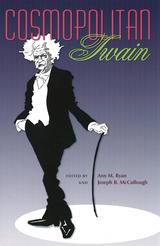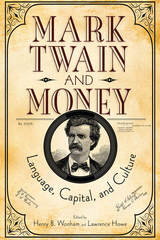2 books by Ryan, Ann M.

Cosmopolitan Twain
Edited by Ann M. Ryan and Joseph B. McCullough
University of Missouri Press
Cosmopolitan Twain takes seriously Mark Twain’s life as a citizen of urban landscapes: from the streets of New York City to the palaces of Vienna to the suburban utopia of Hartford. Traditional readings of Mark Twain orient his life and work by distinctly rural markers such as the Mississippi River, the Wild West, and small-town America; yet, as this collection shows, Twain’s sensibilities were equally formed in the urban centers of the world. These essays represent Twain both as a product of urban frontiers and as a prophet of American modernity, situating him squarely within the context of an evolving international and cosmopolitan community.
As Twain traveled and lived in these locales, he acquired languages, costumes, poses, and politics that made him one of the first truly cosmopolitan world citizens. Beginning with New York City—where Twain spent more of his life than in Hannibal—we learn that his early experiences there fed his fascination with racial identity and economic privilege. While in St. Louis and New Orleans, Twain developed a strategic detachment that became a part of his cosmopolitan persona. His contact with bohemian writers in San Francisco excited his ambitions to become more than a humorist, while sojourns in Buffalo and Hartford marked Twain’s uneasy accommodation to domesticity and cultural prominence. London finally liberated him from his narrowly constructed national identity, while Vienna allowed him to fully achieve his transnational voice. The volume ends by presenting Elmira, New York, as a complement, and something of a counterpart, to Twain’s cosmopolitan life, creating a domestic retreat from the pace and complexity of an increasingly urban, modern America.
In response to each of these cities, Twain generated writings that marked America’s movement into the twentieth century and toward the darker realities that made possible this cosmopolitan state. Cosmopolitan Twain presents Twain’s eventual descent into skepticism and despair not as a departure from his early values but rather as a dark awakening into the new terms of American identity, history, and moral authority. This collection reveals a writer who is decidedly less static than the iconic portrait that dominates popular culture. It offers a corrective to the familiar image of Twain as the nostalgic voice of America’s rural past, presenting Twain as a citizen of modernity and a visionary of a global and cosmopolitan future.
[more]

Mark Twain and Money
Language, Capital, and Culture
Edited by Henry B. Wonham and Lawrence Howe
University of Alabama Press, 2017
This groundbreaking volume explores the importance of economics and prosperity throughout Samuel Clemens’s writing and personal life.
Mark Twain and Money: Language, Capital, and Culture focuses on an overlooked feature of the story of one of America’s most celebrated writers. Investigating Samuel Clemens’s often conflicting but insightful views on the roles of money in American culture and identity, this collection of essays shows how his fascination with the complexity of nineteenth-century economics informs much of Mark Twain’s writing.
While most readers are familiar with Mark Twain the worldly wise writer, fewer are acquainted with Samuel Clemens the avid businessman. Throughout his life, he sought to strike it rich, whether mining for silver in Nevada, founding his own publishing company, or staking out ownership in the Paige typesetting machine. He was ever on the lookout for investment schemes and was intrigued by inventions, his own and those of others, that he imagined would net a windfall. Conventional wisdom has held that Clemens’s obsession with business and material wealth hindered his ability to write more and better books. However, this perspective fails to recognize how his interest in economics served as a rich source of inspiration for his literary creativity and is inseparable from his achievements as a writer. In fact, without this preoccupation with monetary success, Henry B. Wonham and Lawrence Howe argue, Twain’s writing would lack an important connection to a cornerstone of American culture.
The contributors to this volume examine a variety of topics, such as a Clemens family myth of vast landholdings, Clemens’s strategies for protecting the Mark Twain brand, his insights into rapidly evolving nineteenth-century financial practices, the persistence of patronage in the literary marketplace, the association of manhood and monetary success, Clemens’s attitude and actions toward poverty, his response to the pains of bankruptcy through writing, and the intersection of racial identity and economics in American culture. These illuminating essays show how pecuniary matters invigorate a wide range of Twain’s writing from The Gilded Age, Roughing It,The Adventures of Tom Sawyer, The Prince and the Pauper, and A Connecticut Yankee in King Arthur’s Court, to later stories like “The £1,000,000 Banknote” and the Autobiography.
Mark Twain and Money: Language, Capital, and Culture focuses on an overlooked feature of the story of one of America’s most celebrated writers. Investigating Samuel Clemens’s often conflicting but insightful views on the roles of money in American culture and identity, this collection of essays shows how his fascination with the complexity of nineteenth-century economics informs much of Mark Twain’s writing.
While most readers are familiar with Mark Twain the worldly wise writer, fewer are acquainted with Samuel Clemens the avid businessman. Throughout his life, he sought to strike it rich, whether mining for silver in Nevada, founding his own publishing company, or staking out ownership in the Paige typesetting machine. He was ever on the lookout for investment schemes and was intrigued by inventions, his own and those of others, that he imagined would net a windfall. Conventional wisdom has held that Clemens’s obsession with business and material wealth hindered his ability to write more and better books. However, this perspective fails to recognize how his interest in economics served as a rich source of inspiration for his literary creativity and is inseparable from his achievements as a writer. In fact, without this preoccupation with monetary success, Henry B. Wonham and Lawrence Howe argue, Twain’s writing would lack an important connection to a cornerstone of American culture.
The contributors to this volume examine a variety of topics, such as a Clemens family myth of vast landholdings, Clemens’s strategies for protecting the Mark Twain brand, his insights into rapidly evolving nineteenth-century financial practices, the persistence of patronage in the literary marketplace, the association of manhood and monetary success, Clemens’s attitude and actions toward poverty, his response to the pains of bankruptcy through writing, and the intersection of racial identity and economics in American culture. These illuminating essays show how pecuniary matters invigorate a wide range of Twain’s writing from The Gilded Age, Roughing It,The Adventures of Tom Sawyer, The Prince and the Pauper, and A Connecticut Yankee in King Arthur’s Court, to later stories like “The £1,000,000 Banknote” and the Autobiography.
[more]
READERS
Browse our collection.
PUBLISHERS
See BiblioVault's publisher services.
STUDENT SERVICES
Files for college accessibility offices.
UChicago Accessibility Resources
home | accessibility | search | about | contact us
BiblioVault ® 2001 - 2024
The University of Chicago Press









